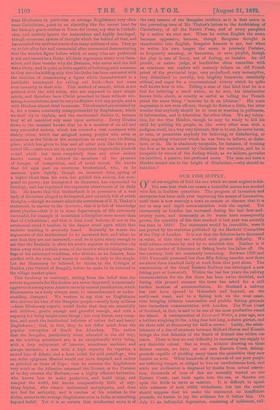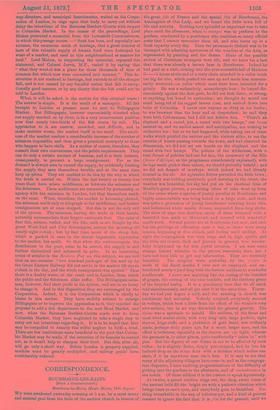OUR FISH SUPPLY.
OF all our supplies of food the one which we most neglect is fish. The seas that wash our coasts a bountiful nature has stocked with fish in limitless quantities. The progress of invention and enterprise has been each year improving the means of locomotion, until there is now scarcely a town so remote or obscure that it is not in easy and rapid communication with the capital. Yet enormously as London has increased during the last four-and- twenty years, and immensely as its wants have consequently grown, the quantity of fish that reached it last year was actually less than in 1848 I The statement would be incredible, were it not proved by the statistics published by the Markets' Committee of the City of London. It is not that the fisheries have decreased in value, or that they are worked with greater difficulty. We shall adduce evidence by and by to establish this. Neither is it that the number of fishermen or fishing boats has fallen off. On the contrary, both are constantly increasing. Between 1820 and 1830 Yarmouth possessed less than fifty fishing smacks, now there are about three hundred daily at work from that port alone. The construction of the Great Eastern Railway has developed a new fishing port at Lowestoft. Within the last few years the railway accommodation for the fish there has been twice doubled, and during this present summer the town has asked for a still further increase of accommodation. In Scotland a railway has just been opened to Helmsdale and beyond, on the north-east coast, and to a fishing loch on the west coast, thus bringing hitherto inaccessible and prolific fishing grounds into immediate communication with London. The West Coast of Scotland, in fact, is said to be one of the most productive round the island. A correspondent of Land and Water, a year ago, saw a halibut weighing 25 lbs., a ling four feet long, a dozen gurnet, and six skate sold at Stornoway for half-a-crown! Lastly, the estab- lishment of a line of steamers between Milford Haven and Kinsale brings the rich fisheries of the South of Ireland also within our reach. There is thus no real difficulty in increasing our supply to any desirable extent. But in truth, without drawing on these distant sources, we have, on our own Eastern Coast, fishing- grounds capable of yielding many times the quantities they now furnish us with. While hundreds of thousands of our poor people are suffering hunger, or obliged to live on unwholesome food, and while our civilisation is disgraced by deaths from actual starva- tion, thousands of tons of fish are annually wasted on our Eastern Coast, cast back again into the sea, or thrown out upon the fields to serve as manure. It is difficult to speak with calmness of such wilful wickedness, but lest the reader should suppose that we make the statement on insufficient grounds, we hasten to lay the evidence for it before him. On July 15 an influential deputation, consisting of noblemen, rail-
way directors, and municipal functionaries, waited on the Corpo- ration of London, to urge upon that body to carry out without delay the intentions of the Baroness Burdett-Coutts with respect to Columbia Market. In the course of the proceedings, Lord Mahon presented a memorial from the Lowestoft Commissioners, in which this passage occurs :—" Such has been, and especially last autumn, the enormous catch of herrings, that a great number of lasts of this valuable supply of human food were destroyed for
want of a market, and used in this neighbourhood as manure for land." Lord Mahon, in supporting the memorial, repeated this statement, and Colonel Jervis, M.P., varied it by saying that "what they wanted was a place for those thousands of tons of common fish which now were converted into manure." This de- struction is not confined to herrings, but extends to all the cheaper fish, and is not caused by any fanciful notion that fish is excep- tionally good manure, or by any theory that the fish could not be sold in London.
What, it will be asked, is the motive for this criminal waste ? The answer is simple. It is the result of a monopoly. All fish brought to London at present must be sent to Billingsgate Market. But Billingsgate, however conveniently situated when our supply reached us by river, is in a very inconvenient position now that nearly two-thirds of the fish comes by rail. The approaches to it are narrow, crowded, and difficult, and to make matters worse, the market itself is too small. The small- ness of the market renders a considerable increase of the number of salesmen impossible, and thus gives a practical monopoly to those who happen to have stalls. As a matter of course, therefore, they consult their own convenience, not the public requirements. They can do only a certain amount of business, and it is their interest, consequently, to prevent a large consignment. For as the demand is always sure to exceed the supply, by artificially limiting the supply they save themselves trouble, and at the same time keep up prices. They are enabled to do this by the way in which the trade is carried on. Within the last twenty or twenty-five years there have arisen middlemen, as between the salesmen and the fishermen. These middlemen are connected by partnership or agency with the salesmen in London, but they themselves reside on the meet. When, therefore, the market is becoming glutted, the salesman needs only to telegraph to the middleman, and farther consignments are at once stopped. But this is not the only evil of the system. The salesmen, having the trade in their hands, naturally accommodate their largest customers first. The sales of dear fish, salmon, turbot, and the like, such as are bought by the great West-End and City fishmongers, occupy the till nearly eight o'clock ; but by that time much of the cheap flab, which is packed in vans in the almost impassable approaches to the market, has spoilt. So that when the costermongers, the distributors to the poor, come to be served, the supply is still farther diminished and enhanced in price. In an interesting series of articles in the Eastern Post on this subject, we are told that on one occasion "two hundred packages of fish sent up by the Great Eastern Railway did not arrive in the market till eleven o'clock in the day, and the whole consignment was spoiled." Thus there is a double waste, at the coast and in London, from which the public and the fisherman alike suffer. The Billingsgate sales- men, however, find their profit in the system, and are in no hurry to change it. And in this disposition they are encouraged by the Corporation. Indeed, it is the Corporation which is chiefly to blame in this matter. They have stolidly refused to enlarge Billingsgate or to improve the approaches to it, they rejected the proposal to add a fish department to the new Meat Market, and now, when the Baroness Burdett-Coutts made over to them Columbia Market, they have neglected to take a single step to carry out her intentions regarding it. It is to be hoped that they may be compelled to remedy this wilful neglect to fulfil a trust. There are few institutions more beneficial to the poor than Colum- bia Market may be made, if the intention of its founder be carried out, as it would help to cheapen their food. But this, after all, will go only a short way. Before London is properly supplied, markets must be greatly multiplied, and railway goods' fares considerably reduced.



































 Previous page
Previous page